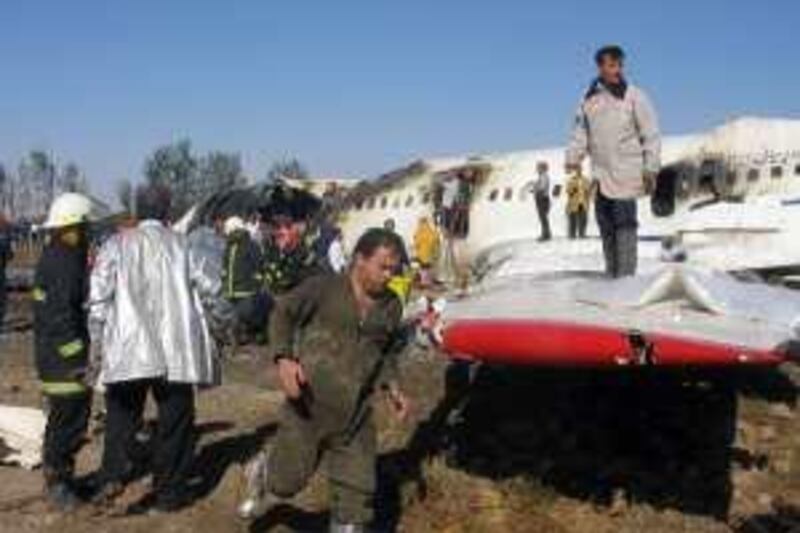TEHRAN // Iran plans to send home all Russian pilots who fly for Iranian airlines. But not quite yet. Before they can be replaced with locals, the Islamic Republic needs to train more Iranian pilots to fly its Tupolev-154s - ageing passenger planes built in the former Soviet Union. Iran plans to phase out these aircraft with Russia's latest version of the Tupolev.
Russian pilots have been blamed for several of Iran's more recent air accidents - most of which have involved Tu-154s - leaving many Iranians wary of Russian pilots and planes built in the former Soviet Union. Such fears may be understandable, given the prominence of such aircraft in recent incidents, but they are largely ungrounded, western aviation experts say. "Russian pilots are some of the best," said David Learmount, the operations and safety editor of Flight International, an authoritative UK-based magazine. "And the [Tu-] 154 was the most successful jet airliner, in terms of numbers built, that the former Soviet Union ever produced."
Philip Butterworth-Hayes, the editor of the UK-based Air Traffic Management Insight, a bi-weekly newsletter, added that the Tu-154 is "intrinsically an extremely safe aircraft" but is now simply outdated. The Russian national carrier Aeroflot announced the retirement of its Tu-154 fleet in January. The Iranian president, Mahmoud Ahmadinejad, cast no aspersions on Russian pilots or Soviet-built aircraft when, setting a two-month deadline, he announced in March that all Russian pilots would be laid off. The reason he gave was that Iran had an adequate number of its own qualified pilots that it wanted to give employment.
While the deadline has slipped, Iran's road and transportation minister, Hamid Behbahani, insisted last week that the decision stood firm. "Sending back foreign pilots is on the agenda" of his ministry, he was quoted as saying by Fars news agency on Wednesday. Other officials have indicated that the Russian pilots are staying - at least for the time being. "It is not possible to set and announce a deadline [for discharging Russian pilots] but the issue is definitely on the agenda," Reza Jaffarzadeh, Iran's Civil Aviation Organisation spokesman, told the Javan Online news portal following Mr Behbahani's comments.
Last January, a Tu-154 burst into flames while landing in fog at Mashhad International Airport. All the 157 passengers and 13 crew members survived the accident. But the Russian pilot was found responsible for the accident by the Iranian authorities. In July, a Tu-154 crashed near the city of Qazvin, killing 168 people on board. The cause of the accident has not been established. Such incidents have left many air travellers jittery. "How many more people should die before Tupolev and Russian pilots are sent home?" said Mahsa Torfeh, 44, an accountant in Tehran. "There is no way I or one of my family members flies on one of those planes".
Travel agencies say that about three months ago Iran's Civil Aviation Organisation instructed them not to specify the type of aircraft to their customers. "Many people will not buy their tickets before knowing what plane they will be flying," said a travel agent in Tehran, who requested anonymity to avoid trouble with authorities. "Although we are not supposed to do so, if our customers insist, we do tell them if the flight is scheduled for a Tupolev. We consider it our clients' undeniable right to know."
He added: "Withholding the information sometimes causes problems for everyone. It's not rare at all that at the time of boarding some passengers are freaked out when they see a Tupolev and refuse to board the plane." Iran came to rely increasingly on Russian planes because sanctions imposed by the United States forbid it from buying new Boeing or Airbus aircraft. But, in an interview, Butterworth-Hayes said: "There is a myth which is completely untrue that Russian aeroplanes and Russian pilots do not fly to the same levels as in the West. That's completely untrue. Russian aircraft are extraordinarily robust and well-designed. They're just outdated."
None of the Tu-154's western contemporaries - such as its equivalent, the Boeing 727-200 - are flying any more, Butterworth-Hayes said. "The issue is supporting the aeroplane," he added. Getting spare parts is a problem and "integrating digital equipment and new communications systems on an aeroplane like that [the Tu-154] is extremely complex and difficult". Learmount added: "Iran's only getting rid of the Tu-154s they've got because they're getting old. They can't go on forever."
No official ban has yet been placed on the aircraft by the country's Civil Aviation Organisation and the transportation and roads ministry last week said Tu-154s in operation should be replaced gradually to avoid inconvenience to air travellers. msinaiee@thenational.ae mtheodoulou@thenational.ae





